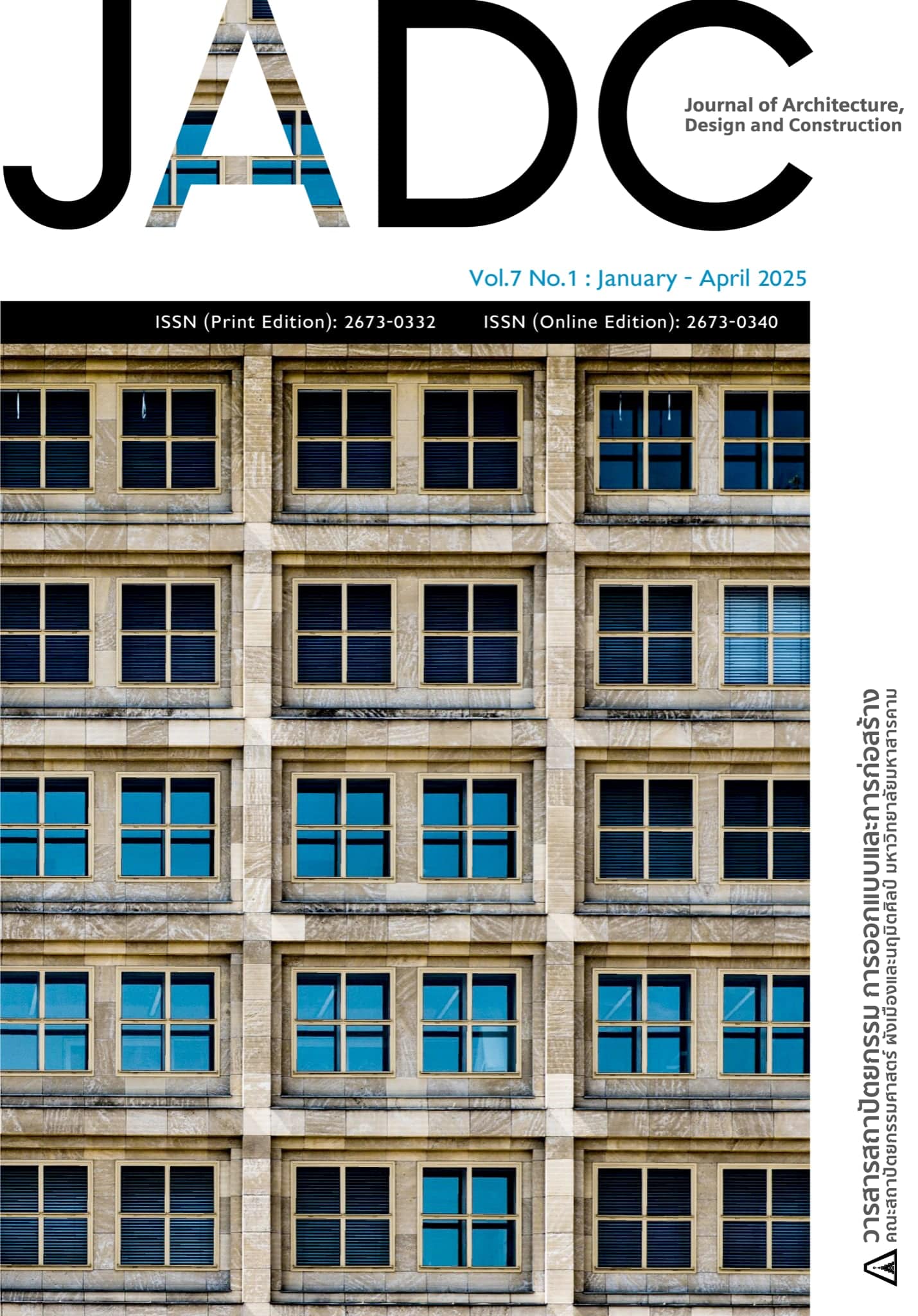ปัจจัยที่ส่งผลต่อการตัดสินใจลงทุนถือครองอสังหาริมทรัพย์บนโลกเสมือน
Main Article Content
บทคัดย่อ
บทความนี้ มีวัตถุประสงค์เพื่อนำเสนอและวิเคราะห์ปัจจัยความคาดหวังของนักลงทุนที่ส่งผลต่อการตัดสินใจลงทุนถือครองอสังหาริมทรัพย์บนโลกเสมือน ผ่านการเก็บข้อมูลจากผู้ที่ได้ลงทุนถือครองและผู้ที่ตั้งใจลงทุนถือครองอสังหาริมทรัพย์บนโลกเสมือนในรูปแบบที่ดินดิจิทัล (Virtual Land) จำนวน 300 คน จากแพลตฟอร์มอสังหาริมทรัพย์เสมือนจริงที่มีในปัจจุบัน โดยใช้แบบสอบถามในการเก็บรวบรวมข้อมูล และใช้วิธีการวิเคราะห์การถดถอยพหุคูณ (Multiple Regression Analysis) ในการศึกษาความสัมพันธ์ระหว่างปัจจัยความคาดหวังด้านต่าง ๆ ที่ส่งผลต่อการตัดสินใจของนักลงทุน ผลการวิจัยพบว่า ปัจจัยความคาดหวังที่ส่งผลที่ต่อการตัดสินใจของนักลงทุนมากที่สุด คือ การมีกิจกรรมด้านโซเชียลมีเดียที่คึกคักมีจำนวนผู้เข้าร่วมเพิ่มขึ้นอย่างต่อเนื่อง และสามารถแสดงออกถึงตัวตนได้อย่างมีอิสระ (Participation) รองลงมา คือ การเพิ่มโอกาสในการสร้างรายได้ (Income) ลำดับถัดมา คือ การสร้างโอกาสในการพบเจอผู้คนที่เพิ่มมากขึ้น (Connection) การนำไปขยายโอกาสทางธุรกิจที่หลากหลาย (Opportunity) การสร้างความน่าเชื่อถือและชื่อเสียงให้กับตนเองได้เป็นที่รู้จักมากขึ้น (Reputation) การได้ครอบครองสิ่งใหม่ก่อนใครและตอบสนองความชื่นชอบภายในจิตใจตนเอง (Infatuation) การเพิ่มขึ้นของมูลค่าทรัพย์สินและความต้องการของตลาด (Value) การมีเอกลักษณ์โดดเด่นเฉพาะตัวที่สร้างประสบการณ์ความดื่มด่ำต่อการใช้งาน ที่สามารถใช้เป็นจุดเด่นและข้อได้เปรียบทางธุรกิจ (Experience) การได้รับโอกาสและสิทธิพิเศษที่เหนือกว่าผู้อื่น (Exclusivity) และการได้ครอบครองในสิ่งที่มีจำนวนจำกัดและผู้อื่นมีความต้องการ (Ownership) ตามลำดับ ซึ่งทั้งหมดส่งผลต่อการตัดสินใจของนักลงทุนในการถือครองอสังหาริมทรัพย์บนโลกเสมือน อย่างมีนัยสำคัญทางสถิติที่ระดับ 0.05
Downloads
Article Details

อนุญาตภายใต้เงื่อนไข Creative Commons Attribution-NonCommercial-NoDerivatives 4.0 International License.
บทความที่ได้รับการตีพิมพ์เป็นลิขสิทธิ์ของวารสารสถาปัตยกรรม การออกแบบและการก่อสร้าง คณะสถาปัตยกรรมศาสตร์ ผังเมืองและนฤมิตศิลป์ มหาวิทยาลัยมหาสารคาม
เอกสารอ้างอิง
Asara, C. (2022). Real estate in the metaverse [Master’s thesis, Politecnico di Milano].
Barrera, K. G., & Shah, D. (2023). Marketing in the metaverse: Conceptual understanding, framework, and research agenda. Journal of Business Research, 155(113420). https://doi.org/10.1016/j.jbusres.2022.113420
Daouk-Oyry, L. (2023). Vroom’s expectancy theory. SAGE Publications.
EY Center. (2023, March 2). How boards can prepare for a future in the metaverse. https://www.ey.com/content/dam/ey-unified-site/ey-com/en-us/campaigns/board-matters/documents/ey-cbm-how-boards-can-prepare-for-a-future-in-the-metaverse.pdf
Fudge, S. (2016, July 13). Maslow’s hierarchy of needs and Toronto real estate for sellers. Urbaneer. https://urbaneer.com/blog/maslow_hierarchy_of_needs_and_toronto_real_estate_for_selling#search/chanyathida2537@gmail.com/_blank
Gentile, C., Spiller, N., & Noci, G. (2007). How to sustain the customer experience: An overview of experience components that co-create value with the customer. European Management Journal, 25(5), 395–410. https://doi.org/10.1016/j.emj.2007.08.005
Guven, I., & Ercan, T. (2022). Factors determining the value of property: Comparison of real world and metaverse. In Proceedings of the 7th International Project and Construction Management Conference (IPCMC 2022), (pp. 565–573). https://www.researchgate.net/publication/364650652_Factors_Determining_the_Value_of_Property_Comparison_of_Real_World_and_Metaverse
JP Morgan. (2022, March 8). Opportunities in the metaverse. https://www.jpmorgan.com/content/dam/jpm/treasury-services/documents/opportunities-in-the-metaverse.pdf
Mcleod, S. (2023, July 26). Maslow’s hierarchy of needs theory. Simply Psychology. https://simplypsychology.org/maslow.html
Mittal, S. K. (2022). Behavior biases and investment decision: Theoretical and research framework. Qualitative Research in Financial Markets, 14(2), 213–228. https://doi.org/10.1108/QRFM-09-2017-0085
Nakavachara, V., & Saengchote, K. (2022). Is Metaverse LAND a good investment? It depends on your unit of account. Puey Ungphakorn Institute for Economic Research. https://doi.org/10.48550/arXiv.2202.03081
Plidroke, K., & Intrachooto, S. (2024). Expectations of real estate investments in the virtual properties. Journal of Architecture Design and Construction, 6(1), 39-50. https://so02.tci-thaijo.org/index.php/Jadc/article/view/263699
Republic realm. (2022, January 17). 2021 Metaverse real estate report. https://everyrealm.com/projects#settle-in
Seidel, S., Berente, N., Yepes, G., & Nickerson, J. V. (2022). Designing the metaverse. In Proceedings of the 55th Hawaii International Conference on System Sciences. https://hdl.handle.net/10125/80151
Serpil, H. (2022). The metaverse or meta-awareness? Journal of Metaverse, 3(1), 1–8. https://doi.org/10.57019/jmv.1093347
Stevens, J. P. (2002). Applied multivariate statistics for the social sciences (4th ed.). Lawrence Erlbaum Associates.
Sungvaribudh, S., & Nasongkhla, J. (2023). Metaverse technology that employs role-playing in self-reflection to promote self-esteem among adolescents. Journal of Namibian Studies, 34(2), 834-844. https://namibian-studies.com/index.php/JNS/article/view/1747
Williamson, D. A. (2020, June 22). Uptick in US adults' social media usage will likely normalize post-pandemic. Insider Intelligence. https://bit.ly/3q8neXW


